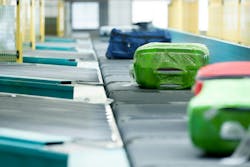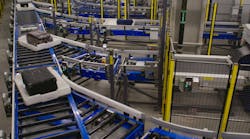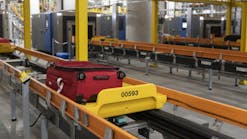Southwest Awards Leonardo Its First U.S. Airport Baggage Handling Contract
Southwest Airlines recently awarded Leonardo a $27 million contract to provide a new baggage handling solution with cross-belt sorter technology for its transfer bag facility at Denver International Airport. The Leonardo solution will remove a labor-intensive, manual sortation and tail-to-tail transfer bag approach. With the reshaping of its baggage handling system, the airline aims to guarantee faster connection times, accommodate tight flight schedules and enhance capacity to handle future passenger volume growth.
The baggage handling system (BHS) for Southwest in Concourse C will be Leonardo’s first baggage handling system at a U.S. airport. Estimated project completion is mid-2025. The technology is already installed in airports throughout Europe and Asia including Hong Kong International, Paris Charles De Gaulle, Orly, Frankfurt, Rome Fiumicino Airport, Milan Malpensa, Zurich, Genève, Lyon airports and others.
The U.S. BHS market is predominantly conventional with lots of conveyors, horizontal diverters, vertical diverters, which are very mechanical in nature and susceptible to jams, low performance and high operations and maintenance costs, said Ravi Singh, Head of Business Development & Sales (BHS) - North America, Leonardo Automation. According to Singh, Leonardo's cross-belt sorter Multisort Baggage Handling System (MBHS) offers advantages over conventional systems including enhanced accuracy, increased sorting speed, and improved scalability. The MBHS technology will enable Southwest to experience improvements in operational efficiency, automatic precise sortation of transfer bags, reduced operator workload, and elimination of existing pain points.
Altogether, the Leonardo solution will include one MBHS cross-belt sorter with three induction lines for a total length of about 500 m/1640 ft to serve 94 destinations. There will also be two conveyor-based bag buffers. Additional technological innovations include advanced IT systems for management, flow management software for intelligent routing and a diagnostic system.
A press release from Leonardo, outlines many benefits: "The MBHS enables airlines to streamline the entire sorting process, optimize resource utilization, and minimize operation expenses, ultimately leading to cost savings for the airline by reducing the cost per bag in the system. Furthermore, this implementation will contribute to a substantial improvement in aircraft turnaround time, translating into shorter layovers, resulting in improved flight schedules and increased customer satisfaction. The overall passenger travel experience will undergo a notable improvement thanks to the elimination of delays and mis-sortation, ensuring that baggage arrives promptly at their destinations. Additionally, Southwest's commitment to improving operator working conditions and ergonomics will be met by alleviating the burden on operators, thus enhancing the staff comfort and safety."
Baggage handling efficiency is especially important for Southwest, which allows passengers to check two bags for free. “Southwest handles far more bags than anyone else in the industry and it’s not even close. This new system at Denver airport helps to modernize our largest operation and provides key efficiencies to our people and customers," Andrew Watterson, Chief Operations Officer at Southwest Airlines, said in a Dec. 18 news release distributed by Leonardo.
“The decision by Southwest to trust their largest and most complex baggage operation in the USA to Leonardo really demonstrates the transformative nature of our baggage technology,” Massimiliano Veltroni, Managing Director of Automation Business Unit, said in the news release. “The application of the MBHS for Southwest at Denver will be game-changing for their operation and I look forward to seeing the system live with real Southwest bags in the near future.”
The MBHS installation consists of a continuous loop transport system, induction lines to load baggage automatically onto the transport system and unloading points. The transport system is made up of trains of carts, with onboard cross-belt cells that move perpendicularly to the direction of the carts (hence the name cross-belt) and assist baggage loading and unloading to the assigned destination. Contactless technologies such as linear motors for propulsion system, inductive power transmission for on-board power distribution and Wi-Fi data transmission, give cross-belt sortation technology increased reliability, a sorting capacity up to 8,400 bags/hour, high operational flexibility with very low noise levels (less than 65 dB).
All critical components are fully redundant and moreover the continuous loop of cells is divided in independent “trains”; each train has its own communication and control system. The failure of a component of one train does not affect the others. Each single cell can be put out-of-service in case of failure, without any impact on the functionality of the train.





